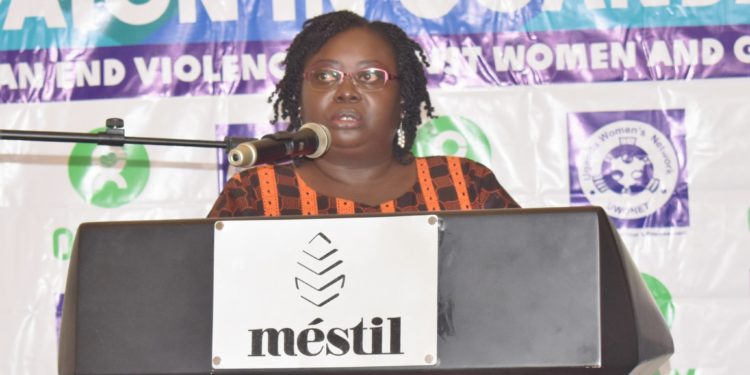The issue of Gender-Based violence being engineered by cultural beliefs in Uganda and Africa at large is still a thorn in fresh since most stakeholders have ignored it.
According to media reports, some people believe that violence against women or girl child is not their business as long as it’s based on cultural practice.
At the start of Covid-19 pandemic in March this year, within just a space of one month, over 3280 cases of Gender-Based Violence (GBV) were reported to the Uganda Police.
Reports from Police and Civil societies have indicated that 98 per cent of the reported cases are stemmed from conflicts over norms related to decision-making, providing family’s needs, conjugal rights, sexual and conjugal relations and gender roles.
While speaking at the launch of a campaign aimed at fighting and ending gender-based violence dubbed ‘Enough is Enough’ at Mestil hotel last week, the Executive Director of Uganda’s Women Network (UWONET) Rita Aciro said that some cultural norms have made others to believe that it is justifiable and acceptable.
“Many acknowledge violence as anti-social behaviour but the lines quickly become blurred when it happens against female. Then they will not speak out when it happens in their local communities, in the workplace or even in their homes. If they do it is to ask, why the survivor did what she did to invitee the violence. These are just a few of the common social norms that underpin violence against women and girls,” she said.
The Formative Research on Social Norms and Violence against Women and Girls in Uganda conducted last year in September by a Social Norm Specialist from Makerere University Prof. Paul Bukuluki to identify social norms that promote Violence Against Women and Girls (VAWG) in Uganda and to understand the different narratives around social norms that promote VAWG in Uganda.
It was found out that some descriptive norms have existed for so long such norms include the belief that Men possess, control and allocate monetary resources in a household, this is especially in the northern region.
Prof Bukuluki added that in this research, they found out that descriptive norms are respected no matter how badly they affect the victims, such norms include a man beating a woman under given circumstances and no one can intervene.
“One should not intervene in a marital matter. If it was between you and your husband, the officer will just say aah, aah, you go back to your husband’s home,” said one of the participants in the research in Isingiro.
Ann Katushabe who lost one of her fingers to VAWG told this website that there is a lot of gender-based violence against women in rural areas. She said that a woman should tolerate physical and other forms of violence because it’s what they know.
“I’m the firstborn all of us are girls but recently when our father died his relatives came and attacked our family, they wanted to take my father’s land alluding that he left no children since all of us are girls and one of the relatives wanted to first kill me and in defending my self I lost my finger,” she said.
Other norms that facilitate GBV is the issue of the Bride-Price where many cultural chiefs in Uganda and Africa at large emphasize that a woman does not leave the man’s home after he has paid bride price even she is mistreated by the man.
If the man has not paid the bride price, you have the right of leaving that home, but not when he has paid the bride price in the lay man’s language she is a property.
“There is that situation where you catch a man in the wrong for instance cheating but instead of him being apologetic he beats you claiming you were spying his movements, claiming he paid you off and he can afford to pay off another woman in case you feel you cannot bear with his conduct’’ said female participant, Lira.
To curb the misperception on cultural norms by perpetrators prof, Bakulili said, “We need to clarifying or correcting misperceptions that are created by Social Norms. We must also emphasize positive benefits for adopting alternative social norms, facilitate individuals, groups and communities to maintain positive social norm change maintenance motives.”
Shanty Francis Odokorach the country director Oxfam Uganda also said that government together cultural leaders must come out and to stop norms that encourage discrimination and violence against women.
Do you have a story in your community or an opinion to share with us: Email us at editorial@watchdoguganda.com













